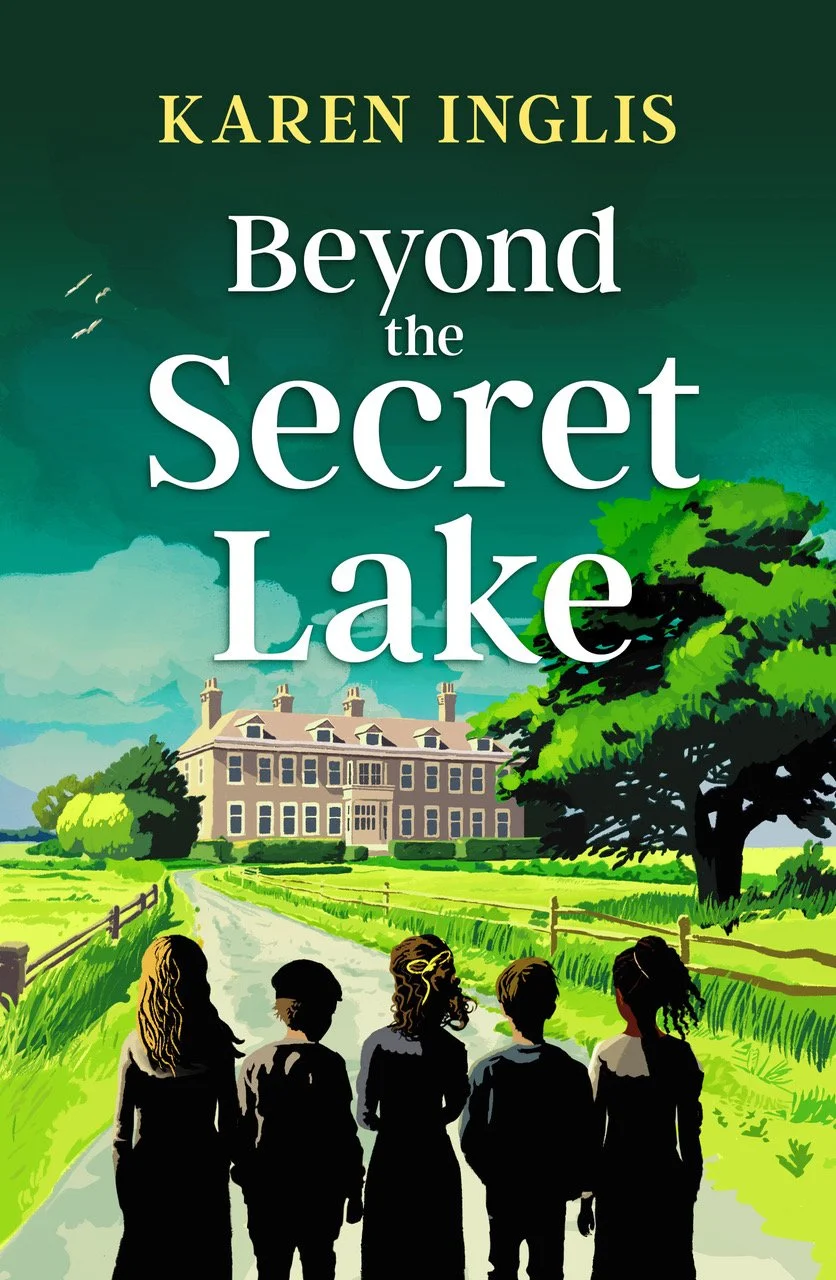I’ve run retreats for others and gone on a solo one, so this isn’t the first time I’ve discussed writing retreats – and it probably won’t be the last! This post is a special collective celebration of an incredible writing group. We’d known each other for years before our first retreat in 2021, in the wake of the pandemic. It took place in Surrey, at Goddard’s, an Arts and Crafts house run by the Landmark Trust. In 2023 we were in Marazion in the far west of Cornwall, in a 19th century house looking out towards St Michael’s Mount. Last April we retreated to the Loire countryside in France.
On the anniversary of that French stay, I thought it would be fun to ask those who’ve attended our retreats what these trips have meant to them and share the challenges and successes they’ve experienced. Contributing are Clare Flynn, Debbie Young, Jean Gill, Alison Morton, Karen Inglis, Liza Perrat, Carol Cooper – and me, of course!
Let’s start with the challenges
Writing is a start-stop affair, so going on retreat is a way to carve out some solid time to concentrate and get words on the page without distraction. That’s the theory, anyway. We’ve found a retreat is also about stepping back to give our thoughts liberty and our concepts a chance to find their way. Our group includes an impressive range of productive writers, who may be traditionally published or publishing independently – or both. We are hard workers, but some projects halt us in our tracks. Some phases of our writing careers lead us to doubt our creative intention and potential. A retreat is a way of getting in touch with what we may have lost sight of. It’s a way of triggering new inspirations and new solutions.
Even when the house is beautiful, the spirit willing and the friends around, though, the muse doesn’t always seem to have come along on the trip. We can feel dry of inspiration or full of doubt about a current work in progress.
Clare at Goddard’s: ‘I spent most of our time frustrated and unable to get any writing done. I didn’t believe in writer’s block until then – if I stared at an empty page for long enough, the words would always flow. But this time I was genuinely stuck.’
Carol in France: ‘My writing wasn’t flowing … I came for a break from the non-fiction book which had a deadline not far away.’
Karen at Goddards: ‘When I first started reading my enormous print-out in the grand dining room, my heart sank; I was suddenly convinced that the MS was dreadful!’
Alison at Goddard’s: ‘I was working on Julia Prima at Goddard’s, working out the horrible complexities of a long journey in the hazardous times of the late 4th century.’
Liza at Marazion: ‘I was having trouble writing in general at this time. I didn’t pen a single word … on the retreat.’
Jean: ‘In Marazion, I did not write one word. … I didn’t settle in the Loire either. … Too many distractions. Ooh, a chateau to visit! Ooh, friend X is talking about her book! Ooh, time to shop or cook!’
Lorna’s writing journal while at Marazion: ‘I feel as if I’ll never write again. …Not one word. Not one scintilla of inspiration. Not one intimation that something is rising to the surface.’
Progress and breakthroughs
Given some have confessed to not writing a word, you might wonder whether a retreat is just a cover term for a holiday with the girls. Certainly wine, good food and laughter play significant parts! But the magic truly happens when we feel stuck: the support of our friends helps to unblock us, whether with a specific project or our worries about our writing identity.
In Marazion, I was tussling with my long-term lack of productivity. It was a kind of existential crisis. I was comparing myself to my friends, some of whom had published several series of books. How could I call myself a writer, when I didn’t write? (Name me a writer who hasn’t asked themselves that painful question!) During one memorable morning, when we were sitting round the kitchen table talking about marketing techniques, that doubt felt overwhelming. But that emotional moment was a pivot moment. It would take more than a year, but by the time I joined the others in the Loire I had, to some degree, changed my life, making sure that I allowed more time for writing. In the Loire I began a new book, One Morning in Provence, which I published by the end of the year. I can’t tell you how good it felt to get something new out into the world!
In Marazion, Liza also broke through a barrier: ‘As I said, I didn’t feel like writing at all on the retreat, but on the long train trip back from Penzance to London, the rest of my story gushed out into my notebook, completely unaided, which was wonderful. I was able to type up these notes at home and continue the novel.’
After Marazion, Jean says, ‘I came home and wrote!’ and also after the Loire retreat, when ‘travel times meant that I had five hours waiting in a train station before going home. Dear readers, I wrote 5,000 words. I’m a 1,000 words a day writer so this was extraordinary. I believe the simmer time and inspiration from the week and conversation was a catalyst.’
Also in the Loire, Clare discarded 10,000 words of her current novel because it wasn’t working out and started again: ‘That retreat enabled the book to get off to a great start – it will be published as The Star of Ceylon in early June 2025 by Storm.’
Carol says of the Loire retreat: ‘It was just the energising interlude I needed. I returned with several ideas for my novel, but more importantly with renewed enthusiasm for my non-fiction MS which had to be delivered within two months of the retreat.’
Lorna’s writing journal in the Loire, where she wrote over 10,000 words: ‘I feel at peace and as if knots are untying. … Unlike Marazion, I’ve done what I wanted to do and go back home feeling self-respect.’
Karen says of her doubts at Goddards: ‘Had I been at home I might have put things off at that point but that wasn’t an option and I stuck at it –realising that it wasn’t nearly as bad as I had feared! By the end of our stay I had made huge inroads and the book eventually came out in March of 2022 and was later shortlisted for a couple of awards! At Marazion … time away forced me not to procrastinate! … As for France … I used the opportunity to dig out an old MS of a futuristic novel for adults and this is something that I am now slowly working on in between other children’s book projects.’
Even when breakthroughs were not spectacular, the sorting out of timelines and locations and logistics made progress. Alison says, ‘I don’t think I had a breakthrough as such on any of the retreats …I just plodded on with my writing.’ But as we all know, each small action, each step, leads us to the goal in the end.
Experience and support
Fellowship is the name of the game but more than that – we offer professional levels of support to one another. There might be practical advice, such as plotting solutions, publishing strategies and marketing techniques. Our instinct to turn to one another for feedback and opinion is heightened when we are together. Liza found her story gushing out on the train because previously she had gone for a walk with Karen on the Land’s End peninsula and Karen made ‘a brilliant suggestion’ that unblocked her.
At Goddard’s on our last afternoon, Clare describes how, seeing how frustrated she was, I suggested a playful approach, selecting random sentences from ‘random books plucked from the bookshelf to act as writing prompts. From a couple of those sentences I got a topic – stained glass windows – and one of my characters. I started writing that afternoon and from that shaky start I produced the three full-length novels in the Hearts of Glass series which were published in 2024 by Storm. A successful trilogy from one afternoon and your stimulus – a fantastic return!’
Wine, women and … stories
The joy of a retreat lies in obvious components such as free time and a fresh location, a break from the norm. But there’s so much more. True friendship that deepens over time. Shared meals and walks in the countryside. Practicality and an element of nagging when required! Recharging creative batteries. We have fun and laughter. We play word games and share extracts. We delight in one another’s successes: in Marazion, Debbie launched her Murder in the Highlands and that was a great cause for celebration. The necklace we gave her is, she says, ‘a talisman for writing a new book set in Cornwall – still a work in progress.’
Liza: ‘Getting to know my lovely author friends, sharing nice moments in the stunning house we rented, exploring Cornwall, which I didn’t know at all, and just loved.’
Jean: ‘The wine😉 Unexpectedly, I enjoyed the games, especially ‘identify which person here wrote this’. It showed that each of us had a distinctive voice. It was SO relaxing to be with others obsessed by writing.’
Alison: ‘Relief from the everyday, the chance to discuss writerly things, just the being amongst fellow writers and exchanging thoughts and ideas.’
Karen: ‘’The group dynamic is wonderful and even though we all write in different genres, we really gel as people and it’s wonderful to be able to share both the ups, downs and challenges of planning and writing a novel.’
Carol: ‘There’s nothing like the camaraderie of writers, even when we’re all writing very different things. I so valued the company, and the many conversations that evolved spontaneously.’
Debbie: ‘Like the Three Musketeers, only more so – all for one and one for all! We celebrate each other’s successes and boost each other when challenged and it was wonderful to be able to do this in real life for a change and to have so much uninterrupted time together.’
Finally
I think we all echo Jean when she says, ‘I am so lucky to call you all friends.’ I’ll give the last word to Clare: ‘All in all, [it’s] the mixture of fresh and stimulating surroundings, great company, sympathetic ears to share writing (and sometimes other) troubles, and lots of time to write and even more importantly, to think. It’s definitely time for another one.’
On that last note, one of the biggest challenges of all is to find a time and a place where as many of us can get together as possible. So far, we haven’t arranged a 2025 retreat. But make no mistake – there will be another …
Check out the books featured above and these authors’ other books by visiting their websites - click on their names at the start of this post. There’s something for everyone - happy reading!
If you’d like to hear more about my books and upcoming publications, sign up for my author newsletter:







































































